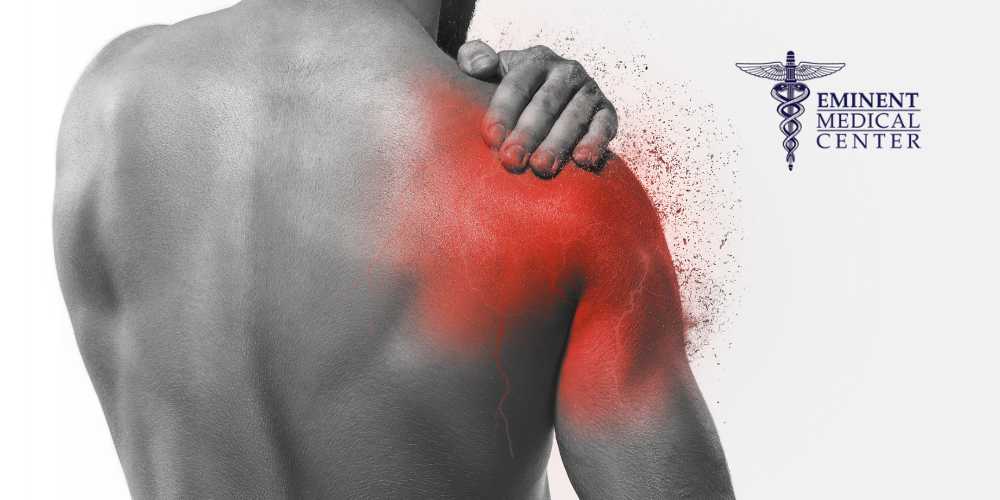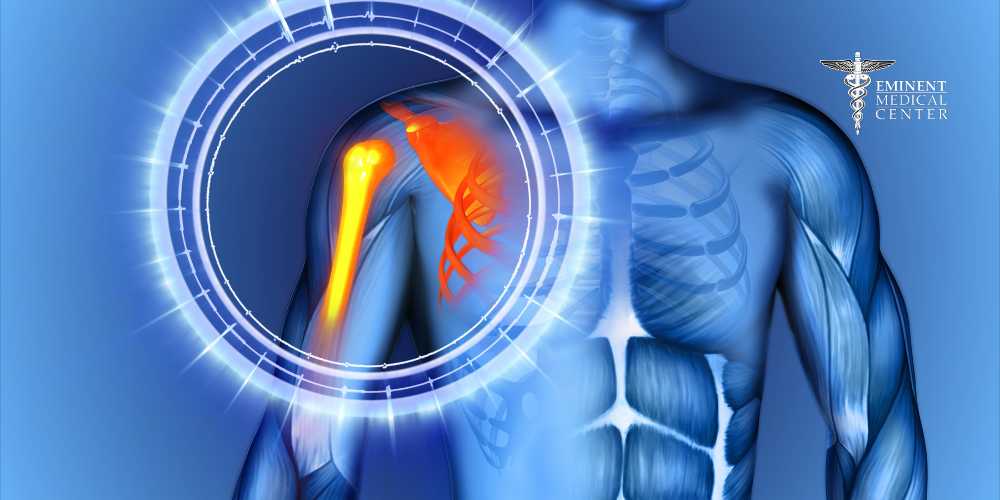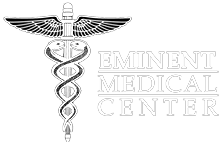Reverse Shoulder Replacement Richardson and Dallas, Texas

Reverse shoulder replacement in Richardson and Dallas, Texas, offers a solution for those dealing with severe shoulder conditions like massive rotator cuff tear arthropathy. At Eminent Medical Center, our orthopedic surgeons offer innovative surgery options for reverse total shoulder replacement, providing significant pain relief and improved mobility with minimal downtime.
For those experiencing persistent shoulder pain, consulting the orthopedic surgeons at Eminent Medical Center about reverse shoulder replacement in Dallas and Richardson can be the first step towards reclaiming your active lifestyle and enhancing your overall quality of life.

What is a Reverse Total Shoulder Replacement?
Reverse total shoulder replacement also called or reverse prosthesis, is a surgical procedure designed to treat severe shoulder arthritis (rotator cuff tear arthropathy) or a severe rotator cuff tear.
A reverse total shoulder replacement surgery reverses the ball-and-socket structure of the shoulder joint. The artificial ball (humeral head) component is attached to the shoulder blade (scalpula), and the artificial socket (glenoid) is placed on the upper arm bone (humerus bone). This reverse prosthesis allows other muscles to compensate for damaged rotator cuff tendons, improve arm movement and provide pain relief.
Patients who undergo reverse total shoulder replacement in the DFW area often experience significant improvements in shoulder mobility and quality of life. It’s particularly beneficial for those with irreparable rotator cuff muscles or severe shoulder arthritis (rotator cuff tear arthropathy).
To learn more about shoulder surgery options, such as reverse shoulder replacement in Richardson and Dallas, contact Eminent Medical Center.
Difference Between Reverse Shoulder Replacement and Regular Shoulder Replacement
When opting for total joint surgery in Richardson, it’s important to know the difference between reverse total shoulder replacement and traditional methods. The primary difference between the two procedures lies in the shoulder joint structure.
In a conventional shoulder replacement, the damaged ball (humeral head) is replaced with an artificial ball (typically a metal ball) attached to a metal stem, and the shoulder blade socket is replaced with an artificial socket. This traditional method of total joint replacement relies on rotator cuff muscles to function correctly.
Conversely, reverse shoulder replacement switches the ball (humeral head) and socket positions, utilizing the deltoid muscle instead of the rotator cuff for shoulder area movement. Reverse total shoulder replacement is ideal for patients with severe rotator cuff injuries, severe rotator cuff tear arthropathy, or other extreme shoulder conditions, offering better stability and range of motion compared to a conventional shoulder replacement.

Who is a Good Candidate for Reverse Total Shoulder Replacement Surgery in the DFW Area?
Good candidates for reverse shoulder replacement surgery in Richarson and Dallas include individuals with severe shoulder pain and limited mobility due to a large rotator cuff tear arthropathy or shoulder arthritis who have not found pain relief from physical therapy or pain medication.
The procedure is also suitable for those who have had a previous failed joint replacement or those with complex fractures in the shoulder area.
Major Rotator Cuff Tears
Major rotator cuff injuries, such as a large rotator cuff tear, can lead to significant shoulder instability and shoulder pain.
Non-surgical treatments like physical therapy and injections may provide some relief, but they often fail to restore full function. In such cases, reverse shoulder replacement in Richardson or Dallas can be an effective solution. A reverse total shoulder replacement surgery allows the deltoid muscle to take over the function of damaged rotator cuff muscles, improving arm movement and reducing pain.
To learn more about rotator cuff tear surgery in Richardson and Dallas, contact Eminent Medical Center.
Rotator Cuff Arthropathy
Rotator cuff arthropathy is a condition that arises when severe rotator cuff tears lead to shoulder arthritis. This combination of damage results in significant pain and limited shoulder function. Patients often experience difficulty lifting their arms and performing everyday activities.
Reverse shoulder replacement in Dallas and Richardson is a preferred treatment for rotator cuff tear arthropathy, as it addresses both the damaged rotator cuff tendons and the shoulder arthritis. By using a reverse prosthesis and reversing the shoulder joint structure, the reverse shoulder replacement procedure allows the deltoid muscle to compensate for the torn rotator cuff, resulting in improved shoulder stability and reduced pain.
Failed Previous Shoulder Replacement
A failed previous shoulder replacement can occur due to various reasons, including implant loosening, infection, or persistent pain. When a traditional shoulder replacement doesn’t provide the expected relief it may require revision surgery; reverse shoulder replacement can be an effective alternative.
This revision surgery is particularly beneficial for patients with a major rotator cuff tear, as it utilizes different muscles to restore shoulder function. By reversing the ball-and-socket configuration, the reverse prosthesis procedure offers improved stability and range of motion, helping patients regain their ability to perform daily activities without pain.
Complex Fractures in the Upper Arm Bone Near the Shoulder Joint
Complex proximal humeral fractures near the glenohumeral joint can significantly impact bone quality and shoulder function. These upper arm bone fractures are often challenging to treat with traditional methods, especially if they involve the shoulder joint.
Reverse shoulder replacement is an effective solution for such cases, as it provides a stable shoulder joint configuration that can accommodate the altered anatomy of the upper arm bone caused by the fracture. Reverse prosthesis helps restore shoulder movement and reduce pain, allowing patients to return to their normal activities more quickly and with better outcomes compared to other treatment options.
To learn more about reverse total shoulder replacement in Dallas or Richardson, TX, contact the orthopaedic surgeons at Eminent Medical Center.
Types of Reverse Shoulder Replacement in Dallas and Richardson, TX
Open Reverse Shoulder Replacement
Open reverse shoulder replacement in Richardson and Dallas is a procedure designed to treat rotator cuff tear arthropathy, complex fractures, or failed previous replacements. This approach involves a larger incision, allowing the orthopedic surgeon greater access to the shoulder joint for precise placement of the implant. While recovery may take longer compared to reverse total shoulder arthroplasty, open surgery provides a reliable solution for patients with significant joint damage.
Minimally Invasive Reverse Shoulder Arthroplasty
Reverse total shoulder arthroplasty is an advanced procedure performed to treat conditions like rotator cuff tear arthropathy and severe arthritis. Unlike a regular shoulder replacement, this approach reverses the natural ball-and-socket structure of the shoulder joint and is performed through smaller incisions, reducing recovery time and post-operative discomfort. For patients in need of anatomic total shoulder arthroplasty or reverse shoulder arthroplasty in Richardson and Dallas, this technique offers a modern solution that restores function and mobility with less disruption to surrounding tissues.
Reverse Total Shoulder Replacement Surgery in the DFW Area: What to Expect at Eminent Medical Center
At Eminent Medical Center, patients undergoing reverse total shoulder replacement in Richardson and Dallas can expect comprehensive care from an experienced orthopedic surgeon. The process begins with a thorough evaluation to determine the best treatment approach.
On the day of the reverse total shoulder replacement, patients are given general anesthesia to provide comfort throughout the procedure. The surgical team then performs the reverse total shoulder replacement, carefully positioning the artificial joint components to maximize function and relieve pain.
After the reverse total shoulder replacement, patients receive detailed instructions on how to approach the recovery period, including instructions for physical therapy.
The goal of Eminent’s surgical facility for orthopedic surgery in Dallas, Texas, is to provide a smooth and successful recovery journey for reverse prosthesis patients.

Before Joint Replacement Surgery
Before total joint replacement surgery, patients undergo a series of evaluations to assess their overall health and shoulder conditions. This includes physical examinations, imaging tests like X-rays or MRIs, and discussions about medical history and current medications. Patients are advised to stop certain medications, like rheumatoid arthritis medication, and follow specific pre-surgery instructions to reduce the risk of complications, like a nerve or blood vessel injury, especially if a blood transfusion is required.
Understanding the potential benefits and risks of a reverse shoulder replacement in Richardson and Dallas is vital, and patients should discuss any concerns with their orthopedic surgeon. Preparation before the reverse total shoulder replacement also involves planning for post-surgery recovery, including arranging for assistance at home and scheduling follow-up appointments.
During Reverse Shoulder Replacement
During the procedure, the patient is placed under general anesthesia. The surgeon makes a skin incision to access the shoulder joint and carefully removes the damaged portions of the bone. The new joint components, consisting of a metal ball and a plastic socket, are then positioned in reverse orientation.
This setup allows the deltoid muscle to control the arm’s movement instead of the damaged rotator cuff. In cases involving complex fractures, a bone graft may be used to stabilize the upper end/proximal humerus. The surgeon ensures the components, including the humeral head, are securely fixed, and the incision is closed with sutures. The entire procedure typically takes about two hours, depending on the individual case. For detailed surgical techniques, reference articles from sources like the Journal of Shoulder and Elbow Surgery (J Shoulder Elbow Surg).
After the Shoulder Replacement Surgery
After shoulder replacement surgery, patients are moved to a recovery area where they are closely monitored. Pain control is a priority, and patients are given pain medication to manage discomfort. The arm is placed in a sling to protect the new joint and allow for initial healing. Physical therapy exercises usually begin within a day or two to promote mobility, prevent stiffness, and relieve pain.
Patients receive detailed instructions on home care, including how to manage pain, care for the surgical site, and perform prescribed exercises. They are also advised on how to reduce the risk of blood clots and prevent dislocation of the artificial joint. Follow-up appointments are scheduled to monitor progress and ensure proper healing throughout the recovery period.
What are the Limitations After Reverse Shoulder Replacement?
After reverse shoulder replacement, patients may experience some limitations in shoulder movement, particularly in external rotation. While reverse shoulder replacement procedures significantly improves function and provides pain relief, it may not restore the full range of motion. Overhead activities and heavy lifting with the operated arm may remain challenging. However, most patients can return to daily activities with minimal discomfort after the surgical procedure.
Physical therapy plays a very important role in optimizing shoulder function and helping patients adapt to their new joint. It’s important to follow the surgeon’s advice and avoid activities that could stress the shoulder excessively and potentially harm blood vessels or cause nerve injury.

Patient Testimonials
Eminent Medical Center strives for the highest quality healthcare and is measured by the satisfaction of our patients overall experience.
EXCELLENTTrustindex verifies that the original source of the review is Google. I just had my second knee replacement surgery within 12 months (Dr. Berry is awesome!) and both were done at Eminent Center. The entire staff is friendly and caring from the time you walk in until the time you leave! Big kudos to the nursing staff. From surgery prep to the operating room to recovery they really have great attitudes. Thanks so much to my floor nurses. They are fantastic!!! Great experience overall!!!Trustindex verifies that the original source of the review is Google. I been here 4 times for my procedures. The best and friendliest staffs a patient can ever ask for!! Keep up the good work!! Thank you!Trustindex verifies that the original source of the review is Google. The team made sure they communicated with me very well. I knew everything I had to do every inch of detail, the facility was great, and the surgery went great. The instructions and follow up was outstanding.Trustindex verifies that the original source of the review is Google. EVERYONE was superb here- from the minute you walk in the door to the minute you leave! Attentive care for my recent surgery- made the process go smoothlyTrustindex verifies that the original source of the review is Google. The staff was amazing during my surgery! Friendly, professional, and caring through my entire experience. As an RN myself it was refreshing to have such a great experience with quality staff! Thank you to all the nurses and staff that cared for me! I highly recommend using this facility!Trustindex verifies that the original source of the review is Google. The place Is clean with a very friendyatavvyTrustindex verifies that the original source of the review is Google. The staff was great. My wait time was minimal. Very nice facility. I would recommend them to anyone needing day surgery such as I did. Thank you Eminent Medical.Trustindex verifies that the original source of the review is Google. Absolutely the best to ever do it! So, kind and the sense of urgency and willing to make you feel comfortable was amazing, good job to the team and my family and I are greatly appreciative!!!Trustindex verifies that the original source of the review is Google. My care was amazing. The food was descent and the doctors went above and beyond to make sure surgery was successful.Trustindex verifies that the original source of the review is Google. The whole experience wasn't stressful at all. The staff was amazing.. from checking in to prepping for the surgery they were friendly and helpful. Also, the building is very nice and they even have a little Bistro right there for those that are waiting. Thank you for making things so easy!
Why Choose Eminent Medical Center for Reverse Shoulder Replacement in Dallas and Richardson, TX
Eminent Medical Center stands out for reverse shoulder replacement due to its team of skilled orthopedic surgeons and state-of-the-art facilities. The center prioritizes patient-centered care, offering personalized treatment plans tailored to individual needs.
With a focus on advanced orthopaedic surgery techniques and comprehensive rehabilitation, Eminent’s surgical facility for shoulder surgery in Richardson and Dallas provides optimal outcomes for patients.
Choosing Eminent Medical Center means receiving top-notch medical care in a supportive and compassionate environment, ensuring a smooth recovery and improved shoulder function. For a consultation on reverse shoulder replacement in the DFW area, call (469) 910-8800.
